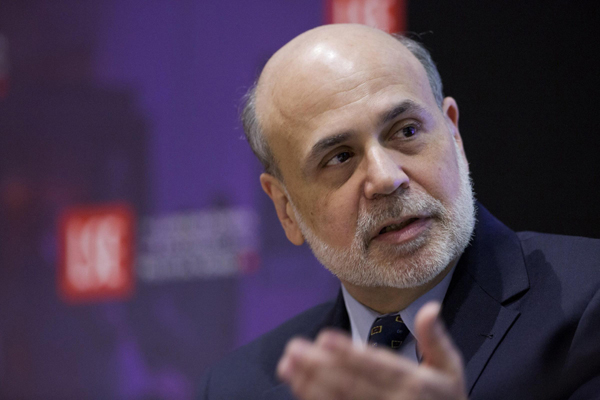Former Fed chief Bernanke sees
no risk of hard landing in China
(Agencies)
Updated: 2015-05-27 14:35
|
 |
|
Former Chairman of the the US Federal Reserve Ben Bernanke speaks at the London School of Economics in London March 25, 2013. [Photo/Agencies] |
Former Federal Reserve Chairman Ben Bernanke said that China's economic slowdown should not worry markets as there was no risk of a hard landing, and emphasized that a move to raise US rates should be viewed as a positive sign for the world's largest economy.
Bernanke, who participated in an open interview at a private-sector forum in Seoul on Wednesday, said the economic slowdown in China is necessary as it needs to change its growth model to be more sustainable in the long term.
"China was growing 10 percent a year. And it was doing that through heavy capital investment, steel plants and so on. Very export oriented," he said.
"As the country gets more rich and sophisticated that kind of growth is no longer successful." He added he was "optimistic" China's economy would not experience a hard landing.
Annual economic growth in the world's second-biggest economy slowed to a six-year low of 7 percent in the first quarter, prompting a range of stimulus measures from Beijing.
Commenting on the Asian Infrastructure Investment Bank (AIIB), Bernanke said it would create an opportunity for more useful projects around the world.
"First of all we care that international institutions do a good job. We have the World Bank and now the AIIB," he said. "The more the better."
Bernanke also said the expected US rate hike would be "anticlimactic" when it happens and that there would only be minor negative impact on South Korea.
"There may be some volatility. Countries like South Korea are very well placed because it has very good policy, good institutions. It's not weak or underdeveloped and doesn't know how to handle capital flows."
A Fed rate hike, expected by markets before the end of this year, would be something to cheer about, said Bernanke, who now works at the Brookings Institution and advises bond giant Pimco and hedge fund Citadel.
"I don't know when (the rate hike will come), but when that begins, that's good news, not bad news because it means the US economy is strong enough."
- China economy loses more steam in April, more stimulus on the cards
- Booming stock market a yes vote for China economy
- PMI rebound points to improving China economy
- Int'l organizations bullish about 'new normal' China economy
- China economy to grow 7.3 pct in 2015: expert
- China economy collapse theory fear-mongering
- German rail giant mulls buying trains from China
- Risk awareness vital for success of trade moves, agency says
- Changing tastes of modern Chinese households
- Top 9 smartphone-driven gadgets
- IT security plan 'to safeguard State secrets'
- Local govt debt rules eased
- Duzhe seeks $81m in Shanghai listing
- Bayern cashes in on Chinese fans' frenzy for European soccer

















